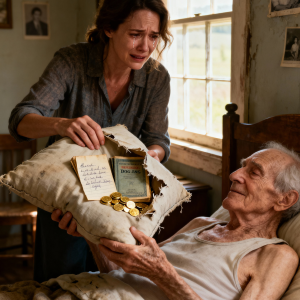
On the outskirts of Baltimore, in a narrow passageway hidden between warehouses, a girl lay asleep inside a dented trash container. The smell of rot surrounded her, but she was lost in dreams of her childhood—memories of playgrounds and her mother’s voice.
That same evening, Cornelius Drake, a billionaire known for his sharp mind and merciless dealings, walked through the alley after a tense meeting. He had spent decades building empires: gleaming skyscrapers in New York, private jets, a collection of rare paintings. Yet every achievement only deepened the hollow ache inside him. He possessed nearly everything, except a sense of meaning.
As he adjusted his coat, a faint whimper drifted from the shadows. Cornelius slowed, frowning. From the rusted dumpster, he heard a sound too fragile to ignore. Curious, he stepped closer. There, huddled against scraps of cardboard, was a girl no older than twelve. Her tangled hair framed a pale face smeared with dirt, her small body thin beneath oversized clothes.
For a man who had lived surrounded by luxury, the sight struck him like a blow. He bent down, lowering his voice.
“Hey… are you alright?”
The girl startled awake, eyes wide with fear. She shrank back, but after noticing his polished shoes and tailored suit, her trembling eased—just slightly.
“Who are you?” she whispered.
“My name is Cornelius. I run businesses here,” he answered, unsure why he felt the need to explain. “Why are you out here alone?”
Her name, she told him, was Isolde. Her parents had vanished months ago after leaving for Chicago to search for work. She had begged for help but was met only with dismissive stares and closed doors.

As she spoke, Cornelius felt something stir within him. Long ago, when his father’s company collapsed, he too had tasted humiliation and hunger. He had clawed his way up from the ruins, but in the process, he had buried his ability to feel pity. For the first time in years, he allowed that old wound to open.
“I know that kind of loneliness,” he murmured. “But you shouldn’t stay here. You deserve better.”
Isolde narrowed her eyes. This wealthy stranger seemed far removed from her world. Why would he care? Why stop for her, when so many others had walked past?
“Why would you help me?” she asked.
“Because I understand what it means to be forgotten,” Cornelius replied. “And because no one should face this alone.”
His sincerity unsettled her, but also gave a fragile spark of hope. After a pause, she asked, “If you really mean it… what can you do?”
He considered. Then, with unusual gentleness, he said, “I can offer you shelter. A place in my home—not forever, but until you find your feet. I’ll make sure you can attend school, meet children your age, and think about a future again.”
The girl studied his face, searching for deceit. Finding none, she slowly rose. “Alright,” she said softly. “If it’s true, I’ll try.”
Cornelius felt a rare warmth in his chest. Together, they left the bleak alley. Dawn was breaking, streaking the sky with light that seemed almost symbolic, as though the city itself approved of this new chapter.
His mansion in Georgetown towered with marble pillars and antique chandeliers, but to Cornelius it had always felt sterile. He resolved to change that. He prepared a bedroom for Isolde with fresh sheets, soft lamps, and shelves of books. It was modest compared to his own suite, but to her it was a palace.

Days passed, then weeks. Isolde slowly adjusted to this foreign reality. Cornelius enrolled her in a reputable school. Though shy at first, she soon discovered friends who treated her with kindness, not suspicion. For the first time in years, she spoke of ambitions—becoming a doctor, perhaps traveling abroad.
Watching her thrive, Cornelius began to reassess his own existence. The relentless pursuit of power and acquisitions felt meaningless beside the small but profound joy of seeing a child regain her smile. Quietly, he began funding programs for abandoned youth, channeling his fortune toward causes that mattered.
Their relationship grew into something neither expected. Isolde found safety, guidance, and the confidence to dream again. Cornelius found in her a mirror that reflected the humanity he had almost forgotten. She reminded him that success was not measured in towers or bank accounts, but in the lives one touched.
Years flowed on. When Isolde received an acceptance letter to Stanford University, Cornelius was at her side, pride softening his usually stern features. They both knew the night in that alley had altered the course of their destinies.
In time, their story spread—of a girl who once slept in refuse and a billionaire who rediscovered compassion. It became a quiet legend, whispered not in boardrooms but in community centers and classrooms.
And so it was proven that wealth alone does not define triumph. True success lies in lifting others from darkness, and in recognizing that even the coldest heart can learn warmth again.



